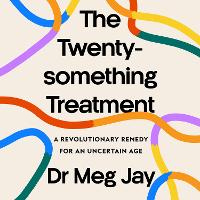


|
|
| book details |
The Twentysomething Treatment
By (author) Meg Jay, Read by Dr Meg Jay

|
This book is currently unavailable. Enquire to check if we can source a used copy
|
| book description |
Our twenties can be challenging. Today, so many twentysomethings are struggling, especially with anxiety and depression, and yet we’re not sure what to think or do about it. In The Twentysomething Treatment psychologist Dr. Meg Jay explores why and unveils a ground-breaking approach that prioritizes skills over pills. As a seasoned clinical psychologist specialising in the unique challenges of this pivotal decade, Dr. Jay dismantles the myth that twentysomethings are fragile beings and explains why medication is sometimes, but not always, the best medicine. Within the transformative pages of this book, Dr. Jay provides practical solutions for a range of problems as she expertly guides readers through finding purpose and embracing uncertainty without unravelling. She offers actionable advice on navigating the intricacies of work, love, sex, friendship, confidence, health and happiness. The Twentysomething Treatment is not just a book; it's a lifeline for a generation grappling with a mental health crisis. It is a roadmap that guides us towards stronger mental health throughout our twenties and beyond.
| product details |
Normally shipped |
Publisher | HarperCollins Publishers
Published date | 9 Apr 2024
Language |
Format | Downloadable audio file
Pages | 0
Dimensions | 0 x 0 x 0mm (L x W x H)
Weight | 0g
ISBN | 978-0-0086-0765-4
Readership Age |
BISAC | psychology / developmental / adulthood & aging
| other options |
|
|
|
To view the items in your trolley please sign in.
| sign in |
|
|
|
| specials |
|

|
Mason Coile
Paperback / softback
224 pages
was: R 520.95
now: R 468.95
|
A terrifying locked-room mystery set in a remote outpost on Mars.
|
|
|
An epic love story with the pulse of a thriller that asks: what would you risk for a second chance at first love?
|
|
|
|